
In 2025, IP location, or IP geolocation, has evolved far beyond targeted ads and geo-VPN blocking. In healthcare tourism, fintech, logistics, public safety, and e-commerce, organizations are leveraging IP location in innovative and often under-the-radar ways. These five use cases reflect recent research insights and real-world implementations.
Real-World Applications of IP Location Technology
1. Health Tourism and Patient Journey Optimization
Use Case: Clinics optimize marketing, appointments, and compliance workflows by geolocating prospective patients via IP.
Health tourism providers, including top hair transplant clinics in Turkey such as Now Hair Time, use IP location data to guide and localize digital interactions. By identifying that a visitor is browsing from Saudi Arabia, Germany, or North Africa, websites can dynamically display language, currency, and localized content. Leading clinics develop microsites and campaign funnels tailored to regional expectations, helping boost qualified leads and reduce friction in the conversion journey.
This technique also supports compliance with regional data laws, including GDPR and KVKK (Turkey’s data protection law), without requiring intrusive GPS permissions.
During remote consultations, approximate IP-derived location is useful for legal verification. Clinics may use this information to confirm whether a patient is located in a country where cross-border medical advice is permitted, helping to address regulatory compliance requirements.
2. Advanced Fraud Detection and Impossible Travel Alerts
Use Case: Banks, e-commerce, and healthcare portals detect anomalous activity based on geographic inconsistencies.
IP geolocation is commonly used to flag impossible travel, such as a login from Turkey followed minutes later by one from Norway. These patterns often indicate credential compromise. By combining IP-derived location with device fingerprinting and behavioral analytics, organizations can build powerful risk models.
While exact numbers vary, industry reports suggest that integrating IP intelligence with multi-factor authentication has helped reduce fraud significantly in sectors like digital banking and telehealth, with some vendor case studies reporting reductions of as much as 60–70% in certain high-risk environments.
3. Real-Time Geofencing for Local Promotions and Emergency Communication
Use Case: Event organizers, clinics, and public agencies deliver messages or restrict content access based on IP-derived location.
IP-based geofencing enables businesses to serve targeted messages or restrict features based on user location. For example, tourism boards or entertainment venues might promote local events to visitors browsing from nearby cities. Likewise, during disease outbreaks or regional health alerts, platforms can display local warnings or guidance in real-time.
Though IP geolocation only offers city-level or regional accuracy, it remains useful for regulatory compliance, helping ensure that content or services are accessible only in authorized areas.
4. Analytics-Driven Infrastructure and Content Optimization
Use Case: CDNs and e-commerce platforms optimize performance and personalization using IP location insights.
Content Delivery Networks (CDNs) route traffic based on user location to reduce latency and improve speed. E-commerce sites go further by using IP location to show regional pricing, shipping estimates, and tax information early in the customer journey. One international retailer reported a 43% reduction in cart abandonment after implementing location-driven pricing and shipping displays.
By preloading country-specific settings such as preferred currency, local inventory, or legal disclaimers, these platforms deliver smoother and more transparent shopping experiences.
5. Public Health, Disease Surveillance, and Urban Planning
Use Case: Governments and NGOs use IP and mobile location data to monitor mobility and model health risk zones.
Although IP data is less granular than GPS, it offers aggregated location insights useful in modeling disease spread or identifying underserved areas. Combined with anonymized mobile data, IP-based analytics help public agencies allocate healthcare resources or plan public transportation routes.
Epidemiologists have used hybrid models involving IP, Wi-Fi positioning, and telecom metadata to track patterns in diseases like malaria, dengue, and COVID-19, especially where traditional surveys fall short.
Research, Accuracy, and Ethical Considerations
IP-based geolocation is typically accurate at the city or regional level, but precision depends heavily on the data provider and how recently the IP address data has been updated. As one systems administrator noted in a widely cited Reddit thread, “accuracy feels like it’s getting worse” when relying on outdated databases. To address this, many enterprises now use multiple third-party providers or subscribe to premium real-time feeds for better accuracy.
From a privacy standpoint, regulatory frameworks such as the GDPR in the EU and CCPA in California treat IP addresses as personally identifiable information (PII), especially when combined with other user data. As a result, many businesses are adopting privacy-preserving geolocation approaches, including:
- Estimating location only when needed
- Using on-device processing
- Avoiding long-term IP storage unless strictly necessary
These steps reduce legal exposure while maintaining the functional benefits of location-aware personalization.
Emerging Trend: AI Meets First-Party Data + IP Intelligence
One of the most forward-thinking applications of IP geolocation is its integration with AI-driven user segmentation and behavioral analytics. Instead of relying solely on location, smart platforms now combine:
- IP-derived regional data
- First-party behavioral data (click patterns, session length, device type)
- Referral sources and repeat visit frequency
For instance, if a user from Qatar visits a clinic’s website three times in two weeks, each time on a mobile device and staying for over 5 minutes, AI models can interpret this as a high-intent lead. Based on that, the system can automatically:
- Display testimonials from Arabic-speaking patients
- Trigger location-specific CTAs (e.g., free consultation offer in their timezone)
- Launch personalized WhatsApp outreach with local pricing and FAQs
Clinics in Istanbul, Dubai, and Barcelona, which are major hubs for medical tourism, have adopted such models to streamline patient acquisition while remaining fully compliant with local privacy laws. This intent-driven personalization is especially valuable in health tourism, where trust and transparency drive decision-making.
DRM and Licensing Compliance
Another less-publicized yet critical use of IP geolocation is in Digital Rights Management (DRM). Streaming platforms, e-learning providers, and SaaS vendors use IP intelligence to enforce content licenses by region.
For example:
- A streaming documentary licensed for the UK is restricted from viewers in the U.S.
- An e-learning course with differential pricing in India is protected from being purchased via a spoofed VPN from higher-income countries
Modern DRM solutions don't rely solely on IP blocking. They detect:
- Login patterns across continents
- VPN usage
- Device fingerprinting mismatches
Platforms like Netflix, Coursera, Vimeo OTT, and Brightcove use advanced geo-compliance to maintain licensing integrity while optimizing user access control.
Logistics and Delivery Optimization
In e-commerce and logistics, IP geolocation plays a growing role in order validation and route optimization.
When a user places an order, their IP location can provide a basic validation of the delivery address, especially for high-value or cross-border shipments. For example:
- If someone claims to be ordering from Austria but their IP resolves to a location in Algeria, this may prompt additional verification steps
- Courier companies can also use IP data to redirect users to the nearest warehouse or estimate local delivery slots in real time
Logistics startups in Europe have reported up to 15% faster order fulfillment after integrating IP intelligence into warehouse-routing logic and last-mile coordination systems.
Cybersecurity, Bot Filtering, and API Abuse Prevention
IP geolocation is now an essential tool in the cybersecurity toolkit, especially for applications that are exposed via public APIs or handle sensitive data.
Organizations use IP-derived intelligence to:
- Block login attempts from high-risk regions
- Rate-limit suspicious traffic
- Detect bots based on origin mismatch or unusual request velocity
For example, an education platform might limit registration attempts from IP blocks associated with known data centers. Similarly, a healthcare platform might flag scheduling attempts coming from mismatched geographies and user agents.
Cybersecurity vendors like Cloudflare, Akamai, and Imperva include geolocation scoring as part of their threat intelligence stack, offering real-time country-based risk assessments.
Ethical Use and the Shift Toward Consent-Based Personalization
Despite its utility, IP geolocation raises valid ethical concerns:
- Are users aware their location is being inferred?
- Is that data stored or shared without their knowledge?
- How accurate and fair are decisions based on that location?
To address these issues, many organizations now opt for consent-based location customization. Examples include:
- Informing users that location will be inferred via IP
- Giving the option to adjust language/currency settings manually
- Avoiding region-specific gating unless legally necessary
This shift reflects a larger privacy-conscious design philosophy focused on delivering relevance without surveillance.
In the EU, the ePrivacy Directive and GDPR already mandate transparency and user choice. U.S. frameworks like the CPRA are following suit. Meanwhile, countries in the Middle East and Asia are rapidly establishing their own cross-border data governance laws.
Final Thoughts
While IP location technology may sound outdated compared to mobile GPS or Bluetooth triangulation, it remains a low-friction, fast, and permissionless tool for improving user experiences, safeguarding platforms, and enforcing global compliance.
Its effectiveness doesn’t rely on pinpoint accuracy, but instead on contextual intelligence through a blend of behavioral patterns, device signals, and AI to make real-time decisions that matter.
Whether it’s a clinic optimizing its outreach to prospective patients, a bank preventing fraud, or a delivery platform speeding up order fulfillment, IP geolocation continues to evolve as a trust-building asset, rather than merely a tracking mechanism.
As privacy expectations rise and digital complexity increases, the most successful organizations will be those that combine data sensitivity with strategic insight, turning location data into ethical, effective action.
Share this post
Leave a comment
All comments are moderated. Spammy and bot submitted comments are deleted. Please submit the comments that are helpful to others, and we'll approve your comments. A comment that includes outbound link will only be approved if the content is relevant to the topic, and has some value to our readers.



Comments (0)
No comment